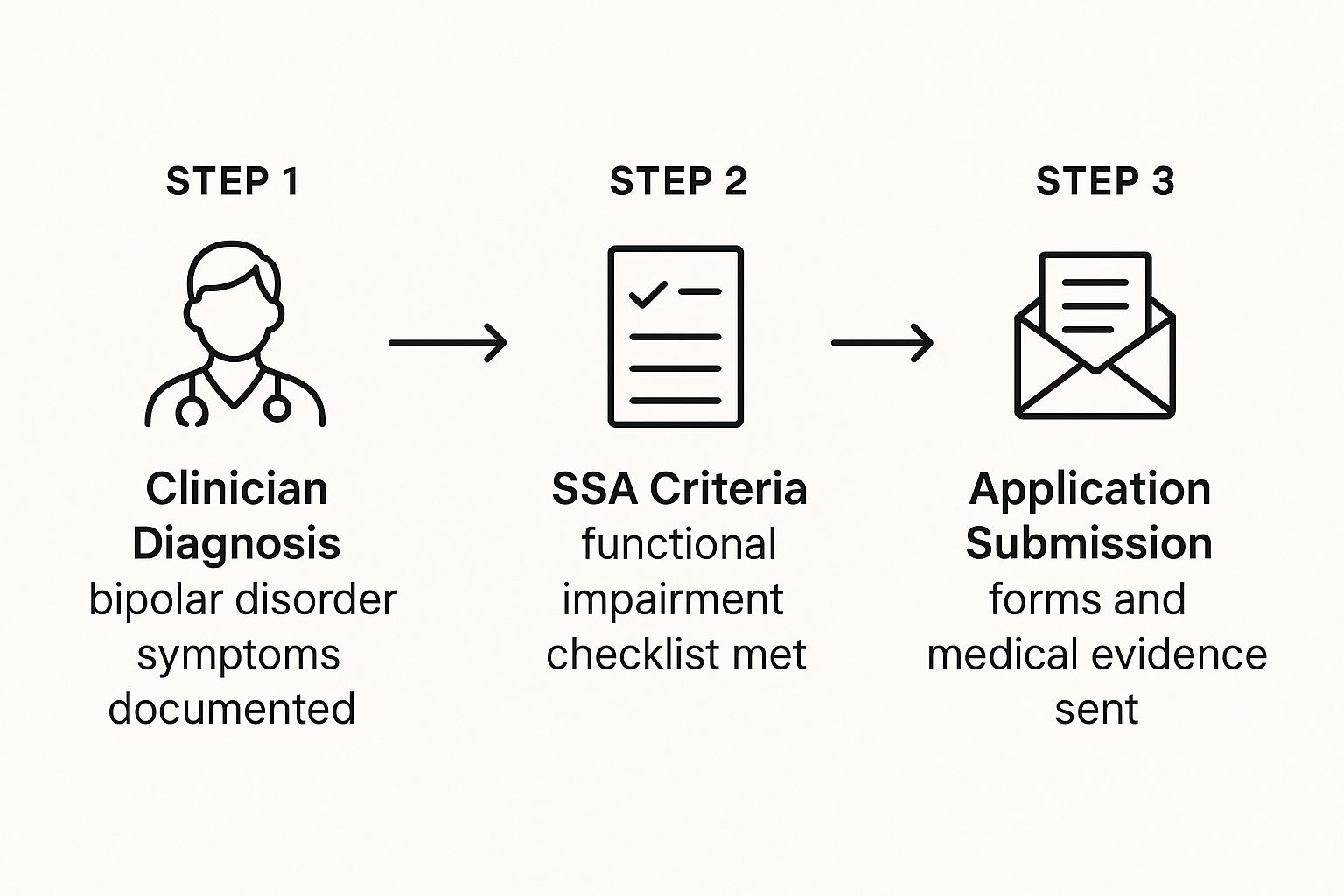Does Bipolar Disorder Qualify as a Disability?
"I was satisfied once John Bell took over my case."
"Communication was always timely."
Does Bipolar Disorder Qualify as a Disability?
Yes, bipolar disorder is absolutely considered a disability. The key thing to understand is that both the Social Security Administration (SSA) and the Americans with an Disabilities Act (ADA) see it as a condition that can seriously get in the way of major life activities, especially holding down a job.
How Bipolar Disorder Qualifies as a Disability
Getting a diagnosis is the starting point, but for a disability claim, what really matters is how the condition affects your day-to-day life. It's less about the medical label and more about the real-world limitations you face.
The person reviewing your case isn't just asking, "Do you have bipolar disorder?" They're asking, "How do your specific symptoms make it impossible for you to work consistently?"
That's a crucial difference. Bipolar disorder isn't just about having "mood swings." It's a condition defined by extreme shifts in mood, energy, and thinking that can completely derail your life. These episodes can shatter your judgment, make it impossible to concentrate, and destroy any chance of being a reliable employee.
A Global Perspective on Bipolar Disorder
This isn't just a local issue; the disabling effects of bipolar disorder are recognized across the globe. The World Health Organization actually ranks it as the sixth leading cause of disability worldwide.
Why? Because the cycle of manic and depressive episodes creates such profound functional impairment, disrupting everything from personal relationships to your ability to work. In fact, people with bipolar disorder face a life expectancy that is, on average, 9.2 years shorter than the general population—a stark reminder of the condition's severity. You can read more about these bipolar disorder statistics and their implications.
For a disability claim to succeed, you have to connect the dots between your diagnosis and your inability to work. It’s about telling the story of how your symptoms, not just the name of your condition, are the real barrier to employment.
Ultimately, your task is to show with clear evidence how these symptoms directly sabotage your ability to perform the tasks your job requires, day in and day out.
To make this clearer, let's look at the two main legal frameworks that recognize bipolar disorder as a disability.
How Bipolar Disorder is Recognized as a Disability
| Social Security Administration (SSA) | Monthly disability income (SSDI/SSI) and Medicare/Medicaid access. | Proving you are unable to perform any substantial gainful activity (work) due to your condition. |
| Americans with Disabilities Act (ADA) | Protects against discrimination and requires employers to provide reasonable accommodations. | Ensuring you have equal opportunity in the workplace, as long as you can perform the essential functions of the job with accommodations. |
As you can see, the SSA is focused on your inability to work at all, while the ADA is about protecting your right to work with necessary support. Both are critical avenues of protection, but they serve very different purposes.
Understanding Why Bipolar Disorder Is Disabling

To really build a strong disability claim, you have to get past the clinical diagnosis and explain why bipolar disorder makes it impossible to work. Think of it like a car with a seriously flawed electrical system. One minute, the engine is revving out of control, and the next, it’s completely dead on the side of the road.
That’s a good way to picture what living with bipolar disorder is actually like. The manic and depressive episodes aren't just "mood swings." They're profound, unpredictable shifts that essentially short-circuit your ability to function in a reliable, consistent way.
The Impact of Manic and Depressive Episodes
During a manic phase, your thoughts might be racing so fast you can't grab onto a single one. Your judgment can fly out the window, making it impossible to focus on a task from start to finish. This can lead to impulsive decisions, serious conflicts with coworkers, and a total inability to follow directions—all things that make holding a steady job impossible.
On the flip side, a depressive episode can be completely paralyzing. It can drain every ounce of motivation, slow your thinking to a crawl, and make even the simplest tasks feel like climbing a mountain. Just getting out of bed can feel like an insurmountable challenge, let alone commuting to a job and performing your duties.
Knowing how to explain these functional limitations is a huge part of building a successful case for mental health disability benefits. These episodes create a cycle of unpredictability that most employers simply can't accommodate.
At its heart, a disability claim for bipolar disorder is about proving this unreliability. It’s not that you don’t want to work; it’s that the condition itself makes sustained work performance impossible.
Functional Limitations in Daily Life
The disabling effects of bipolar disorder ripple out into every corner of life, well beyond the workplace. The condition creates major challenges in a few key areas that the Social Security Administration (SSA) looks at very closely.
- Social Interaction: The extreme mood shifts can strain and even destroy relationships with colleagues, supervisors, and customers, making it incredibly difficult to be part of a team.
- Concentration and Persistence: Both mania and depression wreak havoc on your ability to stay focused, finish projects on time, or even maintain a steady work pace.
- Adapting to Change: Trying to manage stress or adapt to simple changes in a work environment can be enough to trigger an episode, making it nearly impossible to cope with typical workplace pressures.
The global impact of this disorder has grown significantly, affecting over 53 million people worldwide in 2021—a massive jump from about 30 million in 1990. This growth highlights how its disabling effects are being recognized on a much larger scale.
Understanding these functional limitations is critical for your claim. Even exploring general occupational therapy resources can offer great insight into how professionals help people manage these exact daily challenges.
Meeting Social Security Disability Requirements
Trying to understand the Social Security Administration's (SSA) rules can feel like piecing together a massive puzzle without the picture on the box. When the SSA looks at a claim for bipolar disorder, they turn to their master guide, the "Blue Book," which lists all the conditions they consider disabling.
Your condition will be measured against Listing 12.04, which covers Depressive, Bipolar, and Related Disorders. Think of this listing as a specific checklist. You don't need to be a legal scholar to understand it, but you do need to provide clear, compelling evidence showing your symptoms are severe enough to keep you from working.
Decoding the Blue Book Listing 12.04
To satisfy the requirements of Listing 12.04, the first thing your medical records need to do is officially establish your bipolar disorder diagnosis. This is usually straightforward with consistent records from your psychiatrist or psychologist.
But a diagnosis alone isn't enough. The real meat of the claim is proving that your condition causes an extreme limitation in one of the following areas, or a marked (meaning serious) limitation in two of them:
- Understanding, remembering, or applying information: This could mean struggling to follow multi-step instructions or being unable to learn new job tasks.
- Interacting with others: This involves difficulties getting along with supervisors, coworkers, or the general public in a work setting.
- Concentrating, persisting, or maintaining pace: This is all about your ability to stay on task, avoid distractions, and complete your work in a reasonable amount of time.
- Adapting or managing oneself: This gets into the personal side of things—regulating your emotions, controlling your behavior, and even maintaining basic hygiene and grooming.
These functional limitations are the heart of your disability claim. Your evidence needs to tell a story, painting a clear picture of how your symptoms truly disrupt these essential abilities. This graphic helps visualize that journey from diagnosis to application.

As you can see, a clinical diagnosis is just the starting line. Proving your functional impairment is the critical next step that leads to a successful application.
The Medical Vocational Allowance Path
So, what happens if your condition is severe but doesn't perfectly tick every single box in the Blue Book listing? Don't lose hope. There's another route to getting approved called a Medical Vocational Allowance.
This is where the SSA steps back and looks at the whole picture. They'll consider not just your symptoms but also your age, your education, and your work history. They ask a simple question: given your limitations, is there any kind of work you can realistically be expected to do?
If they determine that your bipolar disorder prevents you from doing the jobs you've done in the past and that you can't adjust to some other type of work, they can approve your claim.
"The disability caused by bipolar disorder is quantitatively reflected in estimates of years lived with disability and the disorder’s ranking among the top causes of non-fatal health burden among mental illnesses worldwide. This nonfatal disability burden often peaks in young adulthood when functional impairments from bipolar disorder manifest prominently, affecting education and employment."
This is exactly what the SSA is trying to measure—the real-world impact the condition has on your ability to function. Whether you're aiming to meet a Blue Book listing or qualify through an allowance, strong medical evidence is everything. For a more comprehensive look at the process, take a look at our guide on general Social Security Disability requirements.
Securing Your Rights at Work Under the ADA

When people think about bipolar disorder as a disability, they often focus on the inability to work. But what about your right to work with the proper support? This is where the Americans with Disabilities Act (ADA) comes in, offering a completely different kind of protection than Social Security.
While the Social Security Administration (SSA) is concerned with whether you can hold a job, the ADA is about ensuring you have a fair shot at succeeding in the one you have.
Under the ADA, bipolar disorder is considered a disability if its symptoms "substantially limit one or more major life activities." That's legal-speak, but the concept is straightforward. If your condition gets in the way of fundamental functions—like concentrating, thinking clearly, getting along with others, or keeping your emotions in check—then you have protections under the ADA.
This protection isn't just a feel-good statement. It gives you the legal right to ask for reasonable accommodations from your employer.
What Are Reasonable Accommodations?
Think of a reasonable accommodation as a simple adjustment that levels the playing field. It's a change to your work environment or your duties that helps you do your job effectively without causing an "undue hardship" for your employer.
This is meant to be a conversation, not a demand. It’s a chance for you and your employer to work together to find solutions that benefit everyone. For anyone with bipolar disorder, just keeping a job can be a struggle, so it’s also helpful to look into general strategies to improve workplace productivity to bring good ideas to the table.
Some common and effective accommodations include:
- A flexible schedule: This can make it easier to attend therapy appointments or simply manage fluctuating energy levels.
- A quieter workspace: Moving to a low-traffic area can be a game-changer for maintaining focus.
- Written instructions: Having checklists and clear, written directions helps with memory and organization when your mind feels cluttered.
- Adjusted break times: A few extra short breaks can make a huge difference in managing stress or medication side effects.
- Working from home: The option to work remotely on days when symptoms are flaring up can be invaluable.
The point of the ADA isn't to excuse you from doing your job. It's about removing the barriers that prevent you from doing it well. It gives you a voice to ask for what you need to be a productive member of the team.
It's crucial to understand how the SSA's view of disability differs from the ADA's. They serve two completely different purposes.
SSDI vs ADA: What's the Difference?
The table below really clarifies how these two laws operate in separate lanes. One provides a safety net if you can't work, and the other protects your right to work with support.
| Purpose | Provides financial benefits because you are unable to work. | Protects against discrimination and ensures equal opportunity to work. |
| Definition | Your condition must prevent you from performing any substantial work. | Your condition must substantially limit one or more major life activities. |
| Outcome | You receive monthly income and health insurance. | You receive accommodations to help you perform your job successfully. |
Ultimately, knowing your rights under the ADA gives you the confidence to start productive conversations with your employer. It’s the key to building a supportive work environment where you can not only manage but truly thrive.
Building a Disability Claim That Wins
Getting a diagnosis is just the starting point. It's an important first step, but on its own, it almost never wins a disability claim. The best way to think about it is like you're building a legal case, and the evidence needs to lead to one undeniable conclusion: you are unable to work. To get there, you need a rock-solid foundation of consistent, detailed proof.
The Social Security Administration (SSA) needs to understand, in practical terms, how your bipolar disorder unravels your ability to function. Your medical records are the main pillar of this evidence, but they don't paint the complete picture. A claim that gets approved almost always includes real-world proof of your limitations, going far beyond what a doctor writes down in a chart.
Start With Your Core Medical Evidence
Your medical file is, without a doubt, the most critical part of your application. The goal isn't just to prove you have a diagnosis—it's to show a long-term pattern of severe symptoms and a consistent history of trying to treat them. Your records have to tell a clear, chronological story of your condition and the toll it has taken on your life.
Begin by gathering these key documents:
- Psychiatric and Therapy Notes: These are the detailed notes from your psychiatrist, therapist, or psychologist. They should document your symptoms, the frequency and intensity of your manic and depressive episodes, and how well (or not) you're responding to treatment.
- Medication History: Keep a comprehensive list of every medication you've been prescribed. Include the dosages, the dates you took them, and any side effects you had. This is crucial for showing you’re following your doctor's orders.
- Hospitalization Records: If you've ever been hospitalized for psychiatric care, either inpatient or outpatient, those records are powerful proof of the severity of your condition.
A diagnosis tells the SSA what you have. Your medical history, statements from others, and your own journal tell them how it actually affects you day-to-day. That distinction is everything.
Look for Evidence Beyond the Doctor's Office
As important as they are, medical records can feel clinical and detached. They often miss the full story of your daily struggles. That's why the SSA puts a lot of weight on evidence from non-medical sources—it shows them what your bipolar disorder looks like in the real world, outside the four walls of a clinic.
This is your chance to build a truly compelling narrative. Think about asking people who've seen your struggles up close to write a statement. These "third-party function reports" can be incredibly persuasive.
Good people to ask include:
- Former bosses or coworkers who can talk about your trouble with deadlines, attendance, staying focused, or getting along with the team.
- Family and close friends who can describe how your symptoms impact your ability to do basic things like grocery shop, cook a meal, or manage your own finances.
- Social workers or case managers who have a professional perspective on your limitations over a longer period.
Finally, don't underestimate the power of your own words. Keeping a personal symptom journal can be one of the most effective things you do. Every day, just jot down a few notes about your mood, energy, concentration, and any specific challenges you faced. Over time, this journal becomes a detailed, personal log that connects the dots between your diagnosis and your inability to work, making it an essential piece of the puzzle.
Navigating the Application Process in Oregon

Knowing the rules for a disability claim is one thing, but actually navigating the system? That’s a whole different beast. When you apply for disability benefits in Oregon, your journey begins with the Social Security Administration (SSA), but it doesn't stay there for long. Your application is quickly handed off to a state agency.
This local agency is Oregon’s Disability Determination Services (DDS). Think of the DDS as the place where the real work happens. It’s staffed with disability examiners and medical consultants who will comb through every piece of evidence you've submitted to decide if your bipolar disorder genuinely prevents you from working.
The Reality of Initial Denials
Let's set some realistic expectations right from the start. Initial denials are incredibly common, especially for mental health conditions like bipolar disorder. In fact, a staggering two-thirds of all initial disability applications are denied across the country.
This high denial rate isn't necessarily a judgment on your condition. More often than not, it means the initial paperwork just didn't tell the full story of how your symptoms impact your day-to-day ability to function. An initial denial isn't the end of the road; for most people, it's just the first step.
An initial denial feels like a final verdict, but it's more like the opening statement in a long conversation. The appeals process is where many successful claims are ultimately won, giving you a chance to provide more detail and context.
The most critical thing you can do after a denial is to appeal the decision before the 60-day deadline expires. If you give up here, you've lost your only chance.
Navigating the Appeals Stages
If your initial claim is denied, you’ll enter the appeals process, which unfolds in several stages.
- Reconsideration: This is the first step. Your entire file is sent to a completely new examiner at the DDS for a fresh look.
- Administrative Law Judge (ALJ) Hearing: If the reconsideration is also a denial, your next and most important move is to request a hearing with an Administrative Law Judge.
This hearing is your best opportunity to win your case. You get to testify in person, explain your situation in your own words, and submit new evidence. Having an experienced representative by your side can make all the difference at this stage.
To get a better handle on the local process, you can learn more about applying for Social Security Disability in Oregon and what to expect from the state agencies involved.
Your Top Questions About Bipolar Disability Claims
When you're trying to get disability benefits for bipolar disorder, you're bound to have a lot of questions. It’s a confusing process, and the stakes are high. Let's tackle some of the most common things people ask when they're in the middle of an application or an appeal.
Can I Still Work Part-Time?
This is a big one, and the answer is a careful "it depends." The Social Security Administration (SSA) has a very specific income limit, which they call Substantial Gainful Activity (SGA). If you earn more than that monthly amount, the SSA will likely decide you don't qualify for benefits.
But it’s not always so black and white. The SSA has programs like a Trial Work Period, designed to let you see if you can handle working without immediately losing your benefits. The most important thing here? You must report every penny you earn to the SSA. Hiding income is the fastest way to get your claim denied or your benefits terminated.
My Claim Was Denied. Now What?
First, take a deep breath and don't panic. It is incredibly common for initial disability claims to be denied, especially for mental health conditions like bipolar disorder. This is not the end of the road—you have the right to appeal.
Here's what that process usually looks like:
- Reconsideration: The first step is simple: you ask for a second look. A different examiner will review your entire file from scratch.
- Hearing with a Judge: If your reconsideration is also denied, you can request a hearing with an Administrative Law Judge (ALJ). For many people, this is their best shot at getting approved. It’s your chance to speak directly to the judge and explain how your condition affects you.
Does It Matter If I Have Bipolar I or Bipolar II?
Not as much as you might think. The SSA is far more interested in how your symptoms limit your ability to function than they are in the specific label of your diagnosis. The real question they want answered is: how does your condition stop you from holding down a full-time job?
While a Bipolar I diagnosis, with its clear history of manic episodes, can sometimes paint a clearer picture for the SSA, that doesn't make it an automatic win. Someone with Bipolar II who struggles with debilitating, long-lasting depressive episodes can have just as strong—or even stronger—of a case. The key is proving how your daily life is impaired.
Whatever your specific diagnosis, your job is to build a mountain of evidence showing that your symptoms make it impossible to work consistently.
If your claim was denied or you feel lost in the Social Security Disability maze here in Oregon, our team at Bell Law can help you find your way. We can help you build the strongest case possible. Learn more on belllawoffices.com.
Disclaimer: The information on this page is provided for general informational purposes only and is not legal advice. Reading this content does not create an attorney-client relationship. For advice about your specific situation, please contact a licensed attorney.







